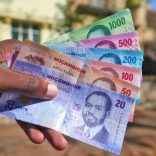Mozambique: Deflation of 0.07% in June
Mozambique: New government aims to reduce debt servicing but meet commitments

File photo: O País
Mozambique’s Ministry of Finance said on Friday that it intends to “reduce debt servicing” but that the government “is committed” to meeting its commitments, despite the need to reduce the burden.
“The Ministry of Finance states that the government is committed to honouring its obligations and will continue to manage public debt in accordance with its Medium Term Debt Strategy 2022-2025,” reads a statement from the ministry.
That was after the new minister of finance, Carla Alexandra Loveira, acknowledged the need to restructure public debt.
The note adds that the government’s “main objective is to reduce debt servicing in the medium term and improve the country’s credit profile.
“With regard to external debt, the government will continue to endeavour to negotiate bilateral external debt in order to achieve its objectives of sustainable public debt management,” it says.
Regarding domestic debt, it states that “reforms are underway in the structure and functioning of the public securities market, with the aim of improving efficiency and reducing domestic public financing costs” – including the “introduction of debt exchange auctions” and the “dynamisation of the secondary market through the introduction of new debt issuance instruments that allow for greater participation by institutional investors, families and individuals.”
On Saturday, the new minister admitted the need to restructure public debt, warning that the country had lost revenue of almost €640 million due to demonstrations contesting the official results of October’s general elections.
“One of the challenges we have, one of the main ones, is the management of public debt,” said Loveira, after the new government took office in Maputo. “The work we have to do is a reflection, a thorough restructuring of our debt, so that within that budget space we can ensure the payment of the debt, but also respond to the current needs of the budget.”
Loveira was deputy minister of economy and finance in the previous administration and was chosen by Mozambique’s new president, Daniel Chapo, to take over as minister of finance.
The cost of servicing Mozambique’s external debt rose 13% in the third quarter of 2024, to $283.92 million (€274 million), between amortisation and interest.
According to the most recent bulletin from the Ministry of Finance, Mozambique spent $212.57 million (€205.5 million) in the third quarter on amortising the capital of the external debt and $71.35 million (€68.9 million) on interest payments.
“This amount represented an increase of 31.82 million dollars [€30.7 million] (13%) compared to the second quarter of 2024,” reads the document.
In the three-month period, Mozambique paid $40.37 million (€39 million) in interest on the “MOZAM 2032” Eurobond issue alone, which was issued in the wake of the so-called “hidden debts” that turned the counry’s finances upside down.
The inauguration of the new government took place after almost three months of violent protests against the process surrounding the general elections.
The protests, called by presidential candidate Venâncio Mondlane – who does not recognise the results, alleging “electoral fraud” – left more than 300 people dead more than 600 suffering gunshot wounds, after they degenerated into violence and clashes with the police, looting, pillaging and the destruction of public and private infrastructure.
“In December alone there was a loss of around fourteen billion meticais [€213 million] in revenue as a result of the demonstrations,” said the new finance minister. “For the whole year, we’re looking at a loss of revenue of around forty-two billion meticais [€639 million]. So this… ended up jeopardising last year’s financial year.”













Leave a Reply
Be the First to Comment!
You must be logged in to post a comment.
You must be logged in to post a comment.